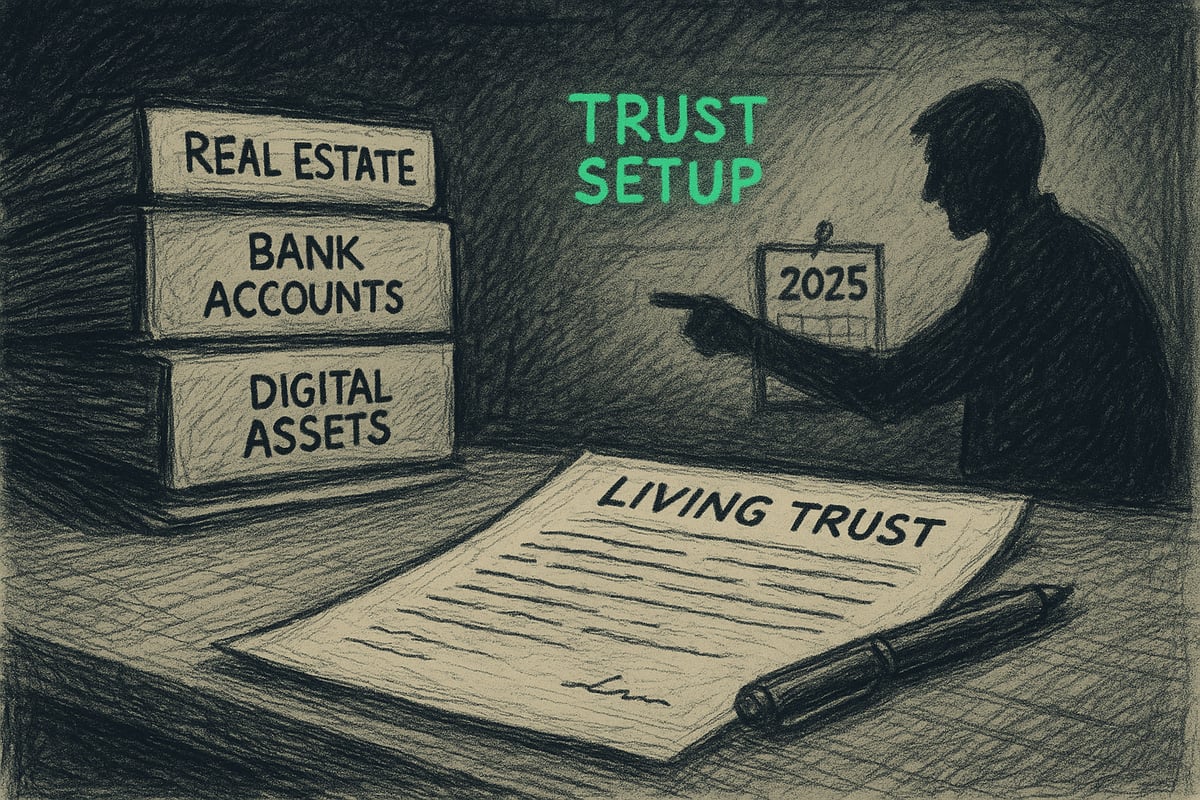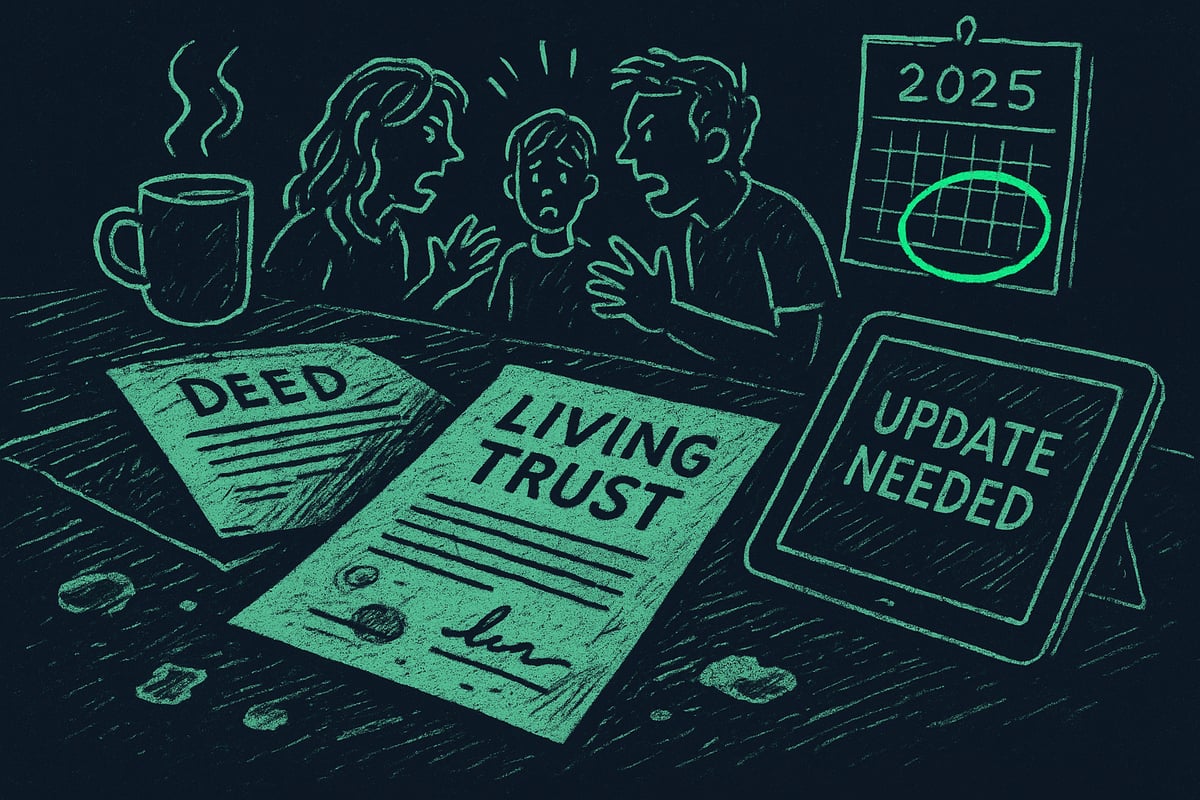Living Trust Near Me Guide: Secure Your Future in 2025

Ever wondered what would happen to your hard-earned assets if something unexpected happened tomorrow? Spoiler: your family might end up in a cage match over your collection of vintage socks and that PlayStation you swore you’d never leave to your ex.
Welcome to the ultimate reality check for procrastinators. In 2025, skipping estate planning is like playing financial roulette with your loved ones’ future. That’s why this living trust near me guide exists—to roast you into responsibility and show you how to actually secure your family’s future.
We’ll break down living trusts, their perks, how to pick a local provider, the legal steps for 2025, and the classic mistakes that leave families feuding. Ready to start planning your death party? Let’s get irresponsible—responsibly.
What Is a Living Trust and Why Does It Matter in 2025?
Ever thought about what would happen to your stuff if you got hit by a meteor, or just slipped on a banana peel? Welcome to adulthood, where the phrase “living trust near me” is more important than your Netflix password. Let’s break down why this is the year to care.

Definition and Core Concepts
A living trust is like a secret vault for your assets, except you get to keep the key while you’re alive. Unlike a will, which only takes effect after your dramatic exit, a living trust lets you manage assets now and after. There are two types: revocable (change your mind as often as your socks) and irrevocable (more like a tattoo, harder to undo). Typical assets you might toss in include your home, investments, bank accounts, and even that collection of rare Pokémon cards.
Why 2025 Is a Critical Year for Estate Planning
Buckle up, because 2025 is about to mess with your plans. Federal estate tax rules are changing, which could mean less of your money goes to your heirs and more to Uncle Sam. For the latest, check the IRS Estate and Gift Tax Updates. Did you know 60% of Americans die without any estate plan at all? (AARP says hi.) Add to that: digital assets, blended families, and the fact that probate courts are more crowded than a Black Friday sale.
Benefits of a Living Trust
Why bother searching for a living trust near me? Consider these perks:
- Skip probate, saving your heirs $3,000 to $7,000 and months of paperwork.
- Keep your business out of the public eye, since trusts aren’t public record.
- Control how and when assets are handed out (no more lump sums to impulsive heirs).
- If you become incapacitated, your chosen trustee steps in, no court drama needed.
| Benefit | Living Trust | Will |
|---|---|---|
| Avoids Probate | Yes | No |
| Privacy | Yes | No |
| Control Distribution | High | Moderate |
Living Trust Myths vs. Facts
Myth: Only rich people need a trust. Fact: Middle-class families use trusts to keep their modest homes and savings out of legal limbo. Myth: Trusts are complicated. Fact: Not having one is way more complicated for your family. Real-life example: The Smiths, with just a house and some savings, used a living trust to keep their kids out of probate court and their nosy neighbor out of their business.
Who Needs a Living Trust Most?
If you have minor kids, a blended family, own property in more than one state, or just want privacy from nosy relatives, you need to Google “living trust near me” yesterday. Seniors prepping for long-term care, and anyone with unique wishes (like leaving your cat a fortune), should also get on board. Don’t let your legacy be a family feud episode.
How to Find the Best ‘Living Trust Near Me’ in 2025
So, you’ve finally accepted your own mortality and want to make sure your family doesn’t end up in a real-life episode of “Succession.” But how do you actually find the best living trust near me provider as we stumble into 2025, when estate laws and digital tools are changing faster than your willpower at a donut shop?

Local vs. Online Providers: What’s Changed?
Not long ago, “living trust near me” meant schlepping to a mahogany-lined office and pretending you understood legalese. Now, the pandemic has turbocharged online estate planning, and suddenly you can set up a living trust from your couch in pajama pants.
Here’s a quick breakdown:
| Provider Type | Typical Cost | Speed | Human Touch | Tech Perks |
|---|---|---|---|---|
| Local Attorney | $1,200–$3,000 | 2–4 weeks | High | Low |
| Online Platform | $300–$700 | 1–7 days | Low-Med | High (e-sign, updates) |
But don’t get seduced by shiny websites. Plenty of online services offering a “living trust near me” are cookie-cutter. Local attorneys might cost more, but they’ll know your state quirks—and probably roast you for your procrastination.
What to Look for in a Living Trust Provider
Not all “living trust near me” options are created equal. If the provider’s website looks like it was built during the dial-up era, run.
Look for:
- Licensed attorneys with a pulse (and state bar number)
- Transparent pricing—no “mystery fees”
- Glowing client reviews from people who don’t sound like bots
- Clear timelines and actual customer support
2025 brings new estate tax rules and digital asset headaches. Make sure your provider tracks legal changes. For a deep dive, check out Mission Wealth Estate Tax Law Changes to see how estate planning is evolving.
Steps to Vetting a Provider Near You
Finding a “living trust near me” isn’t like picking a pizza place—don’t just go with the closest option.
Here’s your survival checklist:
- Google and compare at least three providers
- Check state bar associations for credentials
- Ask: “How do you handle updates if laws change?”
- Demand clarity on fees and turnaround time
- Watch for red flags—pressure tactics, vague answers, or “trust us, bro” vibes
If they dodge your questions, imagine how they’ll dodge your heirs.
Case Study: Choosing Between Two Local Providers
Let’s say you’re torn between “Trusty Law Group” and “EZTrusts Online.” Trusty Law charges $2,000, offers in-person hand-holding, and updates your trust when laws shift. EZTrusts is $500, digital-only, and emails you a PDF.
Ask yourself: Are you paying for expertise or just a glorified template? Sometimes the best “living trust near me” is worth a few extra bucks so your family isn’t left with a legal mess and a bill for emotional damage.
The Importance of Ongoing Support
Don’t just set it and forget it. The best “living trust near me” providers offer ongoing support, free or low-cost amendments, and heads-up emails when laws or your life implode—marriage, divorce, new house, or that surprise crypto windfall.
If your provider ghosts you after you pay, congratulations, you’ve bought a very expensive paperweight.
Step-by-Step Guide: Setting Up a Living Trust in 2025
So, you finally decided to stop tempting fate and start planning your death party. Good. Here’s your crash course on how to set up a living trust near me in 2025, so your family won’t turn Thanksgiving into a courtroom drama after you’re gone.

Step 1: Take Stock of Your Assets
Start by listing everything you own. Yes, everything. That includes your house, your secret crypto stash, your ex’s favorite mug you “accidentally” kept, and even your collection of rare Beanie Babies.
Here’s a table to get your morbid inventory rolling:
| Asset Type | Examples | Valuation Tip |
|---|---|---|
| Real Estate | Home, vacation property | Use recent appraisals or tax values |
| Financial Accounts | Banks, investments, retirement | Check latest statements |
| Digital Assets | Crypto, PayPal, domain names | Document access info, estimate value |
| Personal Property | Cars, jewelry, collectibles | Use receipts or online estimates |
Accuracy matters. A mistake here could mean your living trust near me becomes a “living mess near me.” If your estate could hit new tax thresholds in 2025, check the Federal Estate Tax Exemption 2025 for the latest numbers. Because nothing says “I love you” like a surprise tax bill.
Step 2: Decide on Key Roles
Next, pick your trustee. This is the person who’ll manage your stuff when you’re off to the big sleep. Choose someone trustworthy, not just the cousin who once “borrowed” your car and returned it with a new dent.
Also, name a successor trustee, because life happens. List your beneficiaries, and always have backups. If you skip this, your living trust near me may end up in the hands of your least favorite relative.
Step 3: Drafting the Trust Document
Now comes the paperwork. You can’t just scribble “give it all to my cat” on a napkin. The trust document needs to meet state requirements and use proper legal language.
DIY templates might look tempting, but with laws changing and digital assets in the mix, you’re playing roulette with your legacy. If you want your living trust near me to actually work, invest in professional drafting or a reputable digital service.
Step 4: Fund the Trust
This is where most people drop the ball. If you don’t move assets into your trust, congratulations — you just made a very expensive paperweight.
Transfer property titles, update account beneficiaries, and double-check everything. Forget to fund your living trust near me, and your heirs will be funding their therapist’s next vacation.
Step 5: Notarize and Store Your Trust
Legal requirements vary, but most states want your trust notarized and witnessed. Don’t cheap out — get it done right.
Store the documents safely. Use a fireproof box, a secure digital vault, or both. Your living trust near me should be easier to find than your old high school yearbook, not harder.
Step 6: Review and Update Regularly
Life changes. Marriages, divorces, new grandkids, winning the lottery (hey, it could happen). Review your trust every couple of years or after any big event.
Many providers offer unlimited updates, so use them. An outdated living trust near me is a ticking time bomb for family feuds.
Common Pitfalls and Mistakes to Avoid with Living Trusts
Ever heard someone say, “I set up my living trust near me, so I’m good forever”? Spoiler alert: That’s not how it works. The graveyard is full of people who thought paperwork was a one-and-done deal. Let’s roast the five most common ways people trip over their own estate plans, so your family doesn’t end up in a probate brawl.

Overlooking State-Specific Laws
Every state thinks its trust laws are special, and they’re not wrong. If you search “living trust near me” and skip the fine print, you might end up with a document that’s DOA in probate court. California, Florida, and a few other “sunshine states” have their own rules. And with estate tax changes looming for 2025, the legal landscape is shifting faster than your relatives’ moods at Thanksgiving. Stay current by checking sources like Kiplinger on Estate Tax Changes before you trust your living trust near me to do its job.
Improper Funding of the Trust
Congrats, you printed a shiny new living trust near me document. Did you actually move your house, bank accounts, or crypto into it? If not, your trust is as useful as a will written in invisible ink. Legal surveys show about 30 percent of living trusts fail simply because people forget to transfer their assets. Imagine your family losing the house because your deed is still in your name. Don’t be the reason your heirs start a GoFundMe for probate fees.
Failing to Update After Major Life Events
Life changes, and so should your living trust near me. Did you get divorced, remarried, have more kids, or move across state lines? If your trust still lists your ex as a beneficiary, prepare for family drama worthy of a reality show. Outdated trusts are a top cause of inheritance disputes. The fix? Review your trust after every major milestone, or whenever you feel like tempting fate.
Choosing the Wrong Trustee
Picking a trustee for your living trust near me isn’t like choosing a lunch buddy. This person could control your family’s financial fate. Appointing your unreliable cousin, or someone with a clear conflict of interest, is a recipe for disaster. Vet your candidates like you’re casting the next James Bond: look for trustworthiness, responsibility, and a lack of gambling debts. Monitor their actions, and don’t be afraid to switch trustees if red flags pop up.
Not Coordinating with Other Estate Planning Tools
A living trust near me is powerful, but it can’t do everything. If your will, power of attorney, and beneficiary forms all say different things, you’re basically inviting chaos. Overlapping or conflicting documents can result in court battles and delayed inheritances. Treat your estate plan like a band: all the instruments need to play in tune, or the result is just noise. Review everything together before you take your final bow.
Comparing Living Trusts to Other Estate Planning Tools
So, you typed “living trust near me” because you finally realized your family would rather not battle it out in probate court for your collection of rare vinyls. Good. Let’s roast the other estate planning options and see how they stack up.
Living Trust vs. Will: Which Is Right for You?
Let’s get blunt: a will is basically a to-do list for the court. A living trust, on the other hand, skips the line and hands your stuff to your heirs privately, quickly, and without the judge’s cold glare.
Here’s a table for your comparison-hungry brain:
| Feature | Will | Living Trust |
|---|---|---|
| Probate | Required | Avoided |
| Privacy | Public | Private |
| Cost | Lower upfront | Saves $$ later |
| Control | Simple | Flexible |
| Time | Slow | Fast |
If you want to keep your ex from seeing your net worth, “living trust near me” is the search you need. Wills are fine for the lazy, but trusts are for people who actually care.
Living Trust vs. Joint Ownership/Transfer-on-Death
Sure, you can slap someone’s name on your house or bank account and call it a day. But joint ownership is like giving your roommate your house keys and hoping for the best. Transfer-on-death (TOD) sounds easy, until you realize it doesn’t cover everything.
A living trust near me keeps things centralized and covers all your assets, not just the ones you remembered to label. Want your stuff to go where you want, when you want, without a paperwork fire drill? Trusts win.
The Role of Power of Attorney and Healthcare Directives
Living trusts are the muscle for your assets, but they can’t pull the plug or pay your Netflix bill when you’re drooling in a hospital bed. That’s why you still need a power of attorney and a healthcare directive.
A real estate plan bundles all these tools, so your family isn’t left guessing if you’d want “Stairway to Heaven” played at your bedside.
Real-Life Example: Blended Family Estate Planning
Picture this: Dad dies, stepmom and biological kids circle like sharks. With just a will, it’s courtroom chaos. But with a living trust near me, Dad spelled out who gets what, when, and how. No blood feud, no viral TikTok rants, just a smooth handoff.
Trusts let you control the drama, even after you’re gone.
Statistics and Trends
Think only boomers set up trusts? Pew Research says 33% of Americans have a will, but only 18% have a trust. That’s like half the country daring their families to fight it out. After the pandemic, younger adults are finally searching for “living trust near me,” and the trend is only climbing.
For more on how these numbers break down, check the Pew Research estate planning study.
The Future of Living Trusts: Trends and Innovations for 2025
Let’s face it, you’ll be gone someday, but your digital footprint will outlive your coffee addiction. The living trust near me of the future is going digital, whether you like it or not. In 2025, expect a 40% spike in people setting up trusts online, which means your estate plan can now be created in pajamas while bingeing true crime.
Security is finally catching up. With encrypted e-signatures and digital vaults, you can rest easy knowing your “Don’t let my cousin get my crypto” wishes are locked down. The living trust near me isn’t just a folder in your lawyer’s office anymore. It’s a cloud-based, password-protected beast—and yes, you should probably write down that password somewhere your family can find it.
Tax laws are changing faster than your favorite streaming service’s terms and conditions. In 2025, new rules will hit estate taxes and digital assets. If you’re searching for a living trust near me, make sure your provider is up to date on crypto, NFTs, and whatever digital nonsense you’ve collected. Ignore this, and your heirs might get stuck in legal limbo, arguing over who inherits your meme stash.
Here’s a blunt truth: families aren’t just nuclear anymore. Blended, chosen, multi-generational, LGBTQ+—the living trust near me is getting a makeover to fit real lives, not 1950s sitcoms. Trusts are now built to handle stepkids, exes you’d rather forget, and the weird uncle with three Chihuahuas. Customization is king, so don’t settle for cookie-cutter solutions.
AI isn’t just for making deepfakes of politicians. The living trust near me is now powered by platforms that automate updates, flag legal changes, and even nag you to review your wishes. Here’s a quick look at what’s ahead:
| Feature | 2020 | 2025 Prediction |
|---|---|---|
| Online Trust Creation | Niche, clunky | Mainstream, smooth |
| Digital Asset Support | Rare, risky | Standard, secure |
| AI Automation | Mostly manual | Automated, smart |
| Cost for Setup | $1,200+ | $300–$700 |
Congrats! If you’re still reading, you’re already more responsible than most. The living trust near me of the future is affordable, private, and way less painful than you think. So, start planning your death party—and keep your ex from inheriting your PlayStation.
Alright, let’s be real for a second—you’re going to die someday. We all are. The real plot twist is whether your loved ones get your stuff, or your ex’s new boyfriend ends up sleeping in your bed because you didn’t bother to make a plan. If you’ve made it this far, you already know a living trust (or even a basic will) is the adult thing to do in 2025. Don’t let “future you” be the reason your family ends up on a true crime documentary. Want to get your act together in under 30 minutes? Start My Will Now
Related Articles You Should Read
What Happens If You Die Without a Will in Tennessee: 2026 Complete Guide
What Happens If You Die Without a Will in Tennessee: 2026 Complete Guide Meta Description: Dying without a will in Te...
What Happens If You Die Without a Will in Pennsylvania: 2026 Guide
What Happens If You Die Without a Will in Pennsylvania: 2026 Guide Meta Description: Die without a will in Pennsylvan...
What Happens If You Die Without a Will in New York: 2026 Complete Guide
What Happens If You Die Without a Will in New York: 2026 Complete Guide Meta Description: Die without a will in New Y...